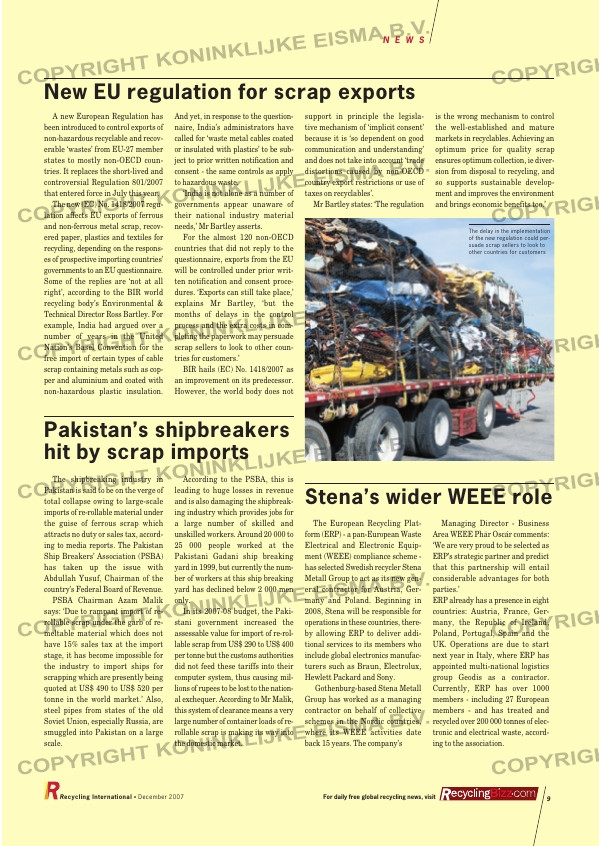Page 9 from: December 2007

N E W S
Stena’s wider WEEE role
A new European Regulation has
been introduced to control exports of
non-hazardous recyclable and recov-
erable ‘wastes’ from EU-27 member
states to mostly non-OECD coun-
tries. It replaces the short-lived and
controversial Regulation 801/2007
that entered force in July this year.
The new (EC) No. 1418/2007 regu-
lation affects EU exports of ferrous
and non-ferrous metal scrap, recov-
ered paper, plastics and textiles for
recycling, depending on the respons-
es of prospective importing countries’
governments to an EU questionnaire.
Some of the replies are ‘not at all
right’, according to the BIR world
recycling body’s Environ mental &
Technical Director Ross Bartley. For
example, India had argued over a
number of years in the United
Nation’s Basel Convention for the
free import of certain types of cable
scrap containing metals such as cop-
per and aluminium and coated with
non-hazardous plastic insulation.
And yet, in response to the question-
naire, India’s administrators have
called for ‘waste metal cables coated
or insulated with plastics’ to be sub-
ject to prior written notification and
consent – the same controls as apply
to hazardous waste.
‘India is not alone as a number of
governments appear unaware of
their national industry material
needs,’ Mr Bartley asserts.
For the almost 120 non-OECD
countries that did not reply to the
questionnaire, exports from the EU
will be controlled under prior writ-
ten notification and consent proce-
dures. ‘Exports can still take place,’
explains Mr Bartley, ‘but the
months of delays in the control
process and the extra costs in com-
pleting the paperwork may persuade
scrap sellers to look to other coun-
tries for customers.’
BIR hails (EC) No. 1418/2007 as
an improvement on its predecessor.
However, the world body does not
support in principle the legisla-
tive mechanism of ‘implicit consent’
because it is ‘so dependent on good
communication and understanding’
and does not take into account ‘trade
distortions caused by non-OECD
country export restrictions or use of
taxes on recyclables’.
Mr Bartley states: ‘The regulation
is the wrong mechanism to control
the well-established and mature
markets in recyclables. Achieving an
optimum price for quality scrap
ensures optimum collection, ie diver-
sion from disposal to recycling, and
so supports sustainable develop-
ment and improves the environment
and brings economic benefits too.’
New EU regulation for scrap exports
Recycling International • December 2007 9
The shipbreaking industry in
Pakistan is said to be on the verge of
total collapse owing to large-scale
imports of re-rollable material under
the guise of ferrous scrap which
attracts no duty or sales tax, accord-
ing to media reports. The Pakistan
Ship Breakers’ Association (PSBA)
has taken up the issue with
Abdullah Yusuf, Chairman of the
country’s Federal Board of Revenue.
PSBA Chairman Azam Malik
says: ‘Due to rampant import of re-
rollable scrap under the garb of re-
meltable material which does not
have 15% sales tax at the import
stage, it has become impossible for
the industry to import ships for
scrapping which are presently being
quoted at US$ 490 to US$ 520 per
tonne in the world market.’ Also,
steel pipes from states of the old
Soviet Union, especially Russia, are
smuggled into Pakistan on a large
scale.
According to the PSBA, this is
leading to huge losses in revenue
and is also damaging the shipbreak-
ing industry which provides jobs for
a large number of skilled and
unskilled workers. Around 20 000 to
25 000 people worked at the
Pakistani Gadani ship breaking
yard in 1999, but currently the num-
ber of workers at this ship breaking
yard has declined below 2 000 men
only.
In its 2007-08 budget, the Paki –
stani government increased the
assessable value for import of re-rol-
lable scrap from US$ 290 to US$ 400
per tonne but the customs authorities
did not feed these tariffs into their
computer system, thus causing mil-
lions of rupees to be lost to the nation-
al exchequer. According to Mr Malik,
this system of clearance means a very
large number of container loads of re-
rollable scrap is making its way into
the domestic market.
Pakistan’s shipbreakers
hit by scrap imports
The European Recycling Plat –
form (ERP) – a pan-European Waste
Electrical and Electronic Equip –
ment (WEEE) compliance scheme –
has selected Swedish recycler Stena
Metall Group to act as its new gen-
eral contractor for Austria, Ger –
many and Poland. Beginning in
2008, Stena will be responsible for
operations in these countries, there-
by allowing ERP to deliver addi-
tional services to its members who
include global electronics manufac-
turers such as Braun, Electrolux,
Hewlett Packard and Sony.
Gothenburg-based Stena Metall
Group has worked as a managing
contractor on behalf of collective
schemes in the Nordic countries,
where its WEEE activities date
back 15 years. The company’s
Managing Director – Business
Area WEEE Phär Oscár comments:
‘We are very proud to be selected as
ERP’s strategic partner and predict
that this partnership will entail
considerable advantages for both
parties.’
ERP already has a presence in eight
countries: Austria, France, Ger –
many, the Republic of Ireland,
Poland, Portugal, Spain and the
UK. Operations are due to start
next year in Italy, where ERP has
appointed multi-national logistics
group Geodis as a contractor.
Current ly, ERP has over 1000
members – including 27 European
members – and has treated and
recycled over 200 000 tonnes of elec-
tronic and electrical waste, accord-
ing to the association.
The delay in the implementation
of the new regulation could per-
suade scrap sellers to look to
other countries for customers
For daily free global recycling news, visit
RI_007 NEWS:Opmaak 1 06-12-2007 14:25 Pagina 9



